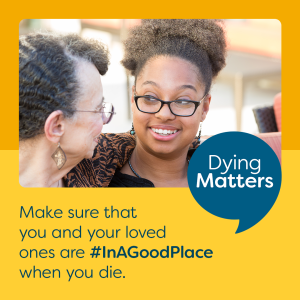This week we are highlighting an important cause – Dying Matters Awareness Week. Dying Matters is a campaign run by Hospice UK that aims to get us talking more openly about death, dying and bereavement. The focus of this year’s awareness week is on what it means to be #InAGoodPlace when we die. To be in a good place at the end life involves having your physical, emotional, financial and spiritual needs met and getting the right care and support. We can only achieve this if we get people thinking about, and talking through, their wishes for end of life care. 
Why is it important to plan for the end of life?
Many people still consider death and dying to be taboo and avoid conversations about these subjects. However, there are a number of decisions that need to be made towards the end of life including how and where you want to be cared for if you become unwell, where you want to be when you die and funeral plans. Everyone is different, so the answer to these questions is individual to you and needs to be discussed with your loved ones and healthcare professionals. Common themes in the research around what makes a ‘good death’ is that people want to ease their symptoms (such as pain and breathlessness), to be treated with dignity and have a sense of control over the process of dying (Krikorian, Maldonado & Pastrana, 2020). When asked about care towards the end of life people tend to value quality of life rather than treatment aimed at extending their lives (Higginson et al., 2014).
But how do you plan for the end of life?
This is where ‘advance care planning’ comes in, this offers people an opportunity to talk through and document their wishes for future care and treatment while they are well enough to make decisions. These discussions are often guided by a simple question, ‘What matters to you?’. In his book, Being Mortal: Medicine and What Matters in the End, the writer and doctor Atul Gawande speaks to a man who has a simple answer to this question – he says his life would continue to be meaningful and enjoyable as long as he could watch football and eat chocolate ice cream! (Gawande., 2014).
As described in the video above, the process of advance care planning can help you to discuss specific aspects of future care including the types of treatment you want or do not want to receive and what you consider important in terms of quality of life. It is particularly important to think about these important questions in advance as we know that many people who are admitted to hospital do not have the ability to make decisions for themselves as they are too unwell (Silveira & Langa, 2010). The consequence of not having a plan in place is that there is a tendency towards over investigation and treatment and a focus on survival rather than quality of life. A lack of clear plans can also cause conflict or distress among families and clinicians (Gross et al., 2018).
If you are interested in making an advance care plan or finding out more about what is involved in making one, Hospice UK have developed a very useful ‘Planning Ahead’ tool.
The ProsPECT Study (Prospective Planning for Escalation of Care and Treatment)
This leads us on to the research we are doing. Our research team are currently exploring how older people with multiple health problems, their families and clinicians make decisions when planning for a future health crisis. Specifically, we are looking at how people think about ‘escalation of treatment’- for example decisions around admission to hospital or the intensive care unit (ICU). We know that older people are open to having these advance care planning discussions but are rarely asked for their opinion about future treatment options (Hopkins et al., 2020). We are currently analysing the findings from interviews and focus groups that we have held over the past year and will be working with our participants to co-design a way to help improve these tricky conversations.

In order to raise awareness about our project we are holding a public engagement event as part of the on the 18 and 19th June. We will be sharing our findings and hosting discussions that will creatively explore the issues raised in our study. Our event centres around an analogy shared with us by a specialist nurse who supports patients making advance care plans. She uses the image of a paper boat on the sea to represent the potential vulnerability of older people with multiple health problems and the concept of stormy weather to highlight the importance of planning for a future health crisis. Come and join us at the festival and consider the question: What matters to you when planning for stormy weather?
You can also find more about our project here and sign up to the Patient Experience Research Centre Mailing List for updates.
This short piece was written by Adam Lound – Research Physiotherapist (@AdamLound / a.lound@imperial.ac.uk ) at the Patient Experience Research Centre, Imperial College, London (@Imperial_PERC)
References:
Gawande, Atul, author. Being Mortal : Medicine and What Matters in the End. New York :Metropolitan Books, Henry Holt and Company, 2014
Gross, J., Williams, B., Fade, P. & Brett, S.J. (2018) Intensive care: balancing risk and benefit to facilitate informed decisions. BMJ. k4135. doi:10.1136/bmj.k4135.
Higginson, I.J., Gomes, B., Calanzani, N., Gao, W., Bausewein, C., Daveson, B.A., Deliens, L., Ferreira, P.L., Toscani, F., Gysels, M., Ceulemans, L., Simon, S.T., Cohen, J., Harding, R., & on behalf of Project PRISMA (2014) Priorities for treatment, care and information if faced with serious illness: A comparative population-based survey in seven European countries. Palliative Medicine. 28 (2), 101–110. doi:10.1177/0269216313488989.
Hopkins, S.A., Bentley, A., Phillips, V. & Barclay, S. (2020) Advance care plans and hospitalized frail older adults: a systematic review. BMJ Supportive & Palliative Care. 10 (2), 164–174. doi:10.1136/bmjspcare-2019-002093.
Krikorian, A., Maldonado, C. & Pastrana, T. (2020) Patient’s Perspectives on the Notion of a Good Death: A Systematic Review of the Literature. Journal of Pain and Symptom Management. 59 (1), 152–164. doi:10.1016/j.jpainsymman.2019.07.033.
Silveira, M.J. & Langa, K.M. (2010) Advance Directives and Outcomes of Surrogate Decision Making before Death. The New England Journal of Medicine. 8.
